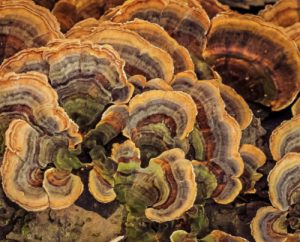Please Note: The Good Food Guide is committed to providing the most up-to-date information on wellbeing as it relates to the health benefits of natural foods. All posts are believed to be accurate according to the best discernment of the author and referenced material. They are posted as a source of information only. They are not intended to diagnose, treat, cure or prevent any disease. All health concerns or conditions should always be assessed by your health care professional.
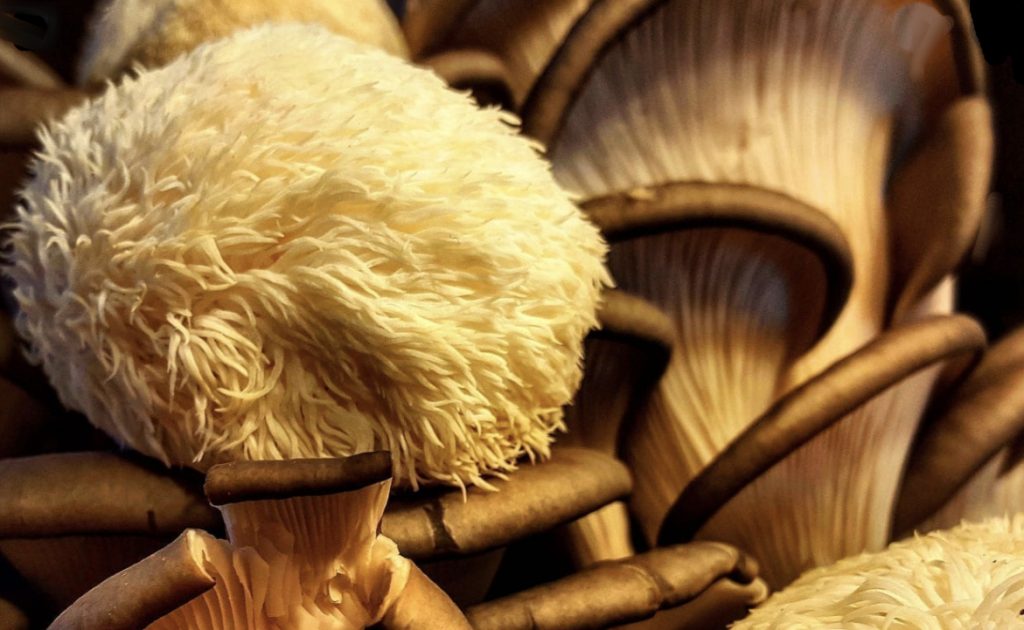
Functional foods offer health benefits that extend beyond their nutritional value. Nutrient-rich foods like fruits, dark green vegetables, nuts, seeds, some grains and mushrooms are considered functional foods because their micro-nutrients have some impressive benefits to help our wellbeing.
Adaptogens are non-toxic plants that also help the body resist stressors of all kinds, whether physical, chemical or biological. These herbs and roots have been used for centuries in ancient healing traditions. Both functional foods and adaptogens are experiencing a renaissance as scientists discover their amazing affects on our health.
First some painless biology
In biology, all species on Earth are categorized into kingdoms. Humans are part of the Animal Kingdom. Then there is the Plant Kingdom which includes all the fruit, veggies, nuts and seeds, grains, grasses and trees you can think of, then add many, many, more. Last scientific count of total number of plants on Earth 309,900. Then there is the Fungi Kingdom. This kingdom is six times the size of the entire Plant Kingdom.
The fungi kingdom, encompasses a wide variety of living organisms. Scientists estimate there anywhere from 2.2 to 3.8 million species on Earth, including some incredibly powerful mushrooms that have been used as medicines for thousands of years. When ingested, they work in the most interesting ways.
There are more than 100 trillion cells in the human body and to say their inner workings are extremely complex seems somewhat of an understatement.
Functional mushrooms are considered intelligent compounds that work on a cellular level.
They are not a cure-all. Rather they increase our cells’ ability to respond to stress, inflammation and disease…even some cancers.
But before diving into how functional mushrooms work, it’s important to understand homeostasis which is critical to survival.

Homeostasis
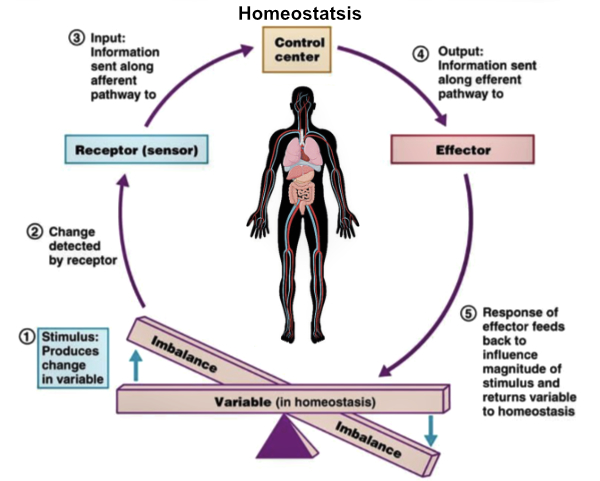
Basically homeostasis means balance and every species on Earth constantly battles to maintain this balance.
When talking survival, maintaining homeostasis is one of the most important evolutionary advantages we possess because we all live in conditions that are in constant flux.
For example, homeostasis is how we maintain our internal body temperature. As warm-blooded creatures, humans need to increase or decrease temperature internally depending on what we are experiencing activities in the external environment. Think taking a walk on a hot summer’s day or an icy-cold winter’s day for that matter. If our internal systems fail to adapt to these different environments we’re in serious trouble.
Another example is how our bodies process glucose. It’s the only element of sugar the body uses directly. It is essential for the brain to function. Too much glucose, you get sick; too little you get sick. Homeostasis keeps it in check. Maintaining the correct balance of water is another example. Cells that have too much water bloat; those with too little shrink.
Even the nervous system requires this balancing act. It replies on homeostasis for breathing patterns to ensure the body is getting the appropriate amount of oxygen.
All this internal complexity working in an environment that is constantly changing, it’s not surprising that homeostasis can get out of whack easily. That’s where adaptogens enter the picture — they help our internal systems find the ‘middle way’.
Back to Adaptogens and Functional Mushrooms
Adaptogens literally ‘adapt’ to the body’s requirements by providing maintenance support when external stressors take aim. In doing so, they help to modify and regulate hormonal production and communication flow.
This is an intrinsic feature of adaptogens. It sets them apart from artificial stimulants and other quick fixes – think caffeine or processed sugars.
In the case of functional mushrooms they can be both functional nutrition when prepared as part of your meal and adaptogenic when taken as an extract.
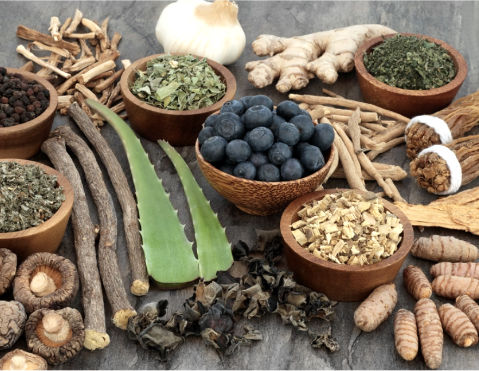
Why extract? Some raw functional mushrooms are not edible because they are too woody or taste awful but their adaptogenic properties are still impressive and they possess dual properties. In short, their benefits overlap. Their ‘adaptive’ nature enables them to assist the body in multiple ways like promoting both energy and sleep which help maintain homeostasis.
To help understand how functional mushrooms work, think thermostat. Once a thermostat reaches the optimal temperature, it turns off. When the temperature lowers, the thermostat activates.
Adaptogens are similar. They give the body what is needed, when it’s needed, to bring it back into balance thereby avoiding the inevitable ‘crash’ that can follow like when ingesting ‘quick’ fixes like sugar or caffeine.
As for the immune system, functional mushrooms not only support immunity, they act as immuno-regulators. Meaning they help calm an overactive immune system when stressed or increase its activity when sluggish. That’s because they have beta glucans.
Found in the cells of functional mushrooms, different beta glucans are specific to individual functional mushrooms, each enhancing the immune system in a slightly different way. Some have been shown to possess anti-inflammatory benefits, others anti-viral or anti-cancer properties and others cardio-protective properties. And no, they are not magic mushrooms — functional mushrooms are not psilocybin mushrooms. Functional mushrooms are not hallucinogenic.
Functional Mushrooms and Infused Consommés
While some functional mushroom can be eaten, others cannot because they are too ‘woody’ or the flavour is just plain nasty. To take the guess work out of flavour and dosage, many functional mushrooms are turned into a powdered extract, acting much like a food supplement. That’s why we use them in our consommés. No need to remember to take a pill before meals or after meals or in the morning or in the evening. By adding functional Mushroom Extracts to our infused consommés, we’ve eliminated the guess work while ensuring high bio-availability, purity and consistency. All you have to do is warm it, sip it and relax.
All the functional mushroom extracts we use in our consommés are processed in Canada. They are organically grown and no starch, mycelium or grains are used in processing. They are scientifically verified by independent labs.
Plant Based Functional Nutrition Backed by Science
Chaga
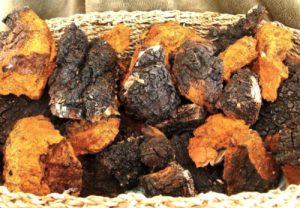
Found growing on birch trees in colder climate like Siberia, Northern Canada and Alaska, Chaga is loaded with impressive health benefits.
Chaga has the highest ORAC scores of any food. ORAC stands for “oxygen radical absorbent capacity.” The higher the ORAC value, the better a food’s ability to protect the body from disease-causing free radicals. It also means that chaga mushrooms are one of the best sources of antioxidants with an ORAC value of 146,700.
Chaga is rich with a wide variety of vitamins and minerals including B-complex, Vitamin D, Potassium, Rubidium, Cesium, Amino Acid, copper, zinc, selenium, iron, manganese, magnesium and calcium. As an antioxidant powerhouse, they are excellent contenders for fighting free radicals and inflammation
Researchers have also investigated Chaga in combating cancer for a long time .
Testing is still ongoing, but of particular interest are the ethanol-soluble lanostanic triterpenoid antioxidants. These are antioxidants that mitigate the damaging effects of free radicals that harm tissue and interfere with DNA replication. That’s important because a breakdown in the antioxidant capacity of cells is suspected to underlie various health challenges, such as inflammation, premature aging, and some cancers.
References:
https://ieeexplore.ieee.org/document/5305591?reload=true%E2%88%82%3D1
https://link.springer.com/article/10.1007/s11094-006-0194-4
https://iubmb.onlinelibrary.wiley.com/doi/abs/10.1002/biof.552210120
https://pubmed.ncbi.nlm.nih.gov/18997282/
Shiitake Mushrooms
Shiitake mushrooms are one of the most popular mushrooms in the world. Not only do they taste great, they are a natural source of fibre, vitamins and minerals. In addition, shiitake contain many of the same amino acids as meat.
Shiitakes contain many chemical compounds that protect your DNA from oxidative damage. Lentinan heals chromosome damage caused by anticancer treatments. Eritadenine helps reduce cholesterol levels and supports cardiovascular health. They contain compounds that inhibit the absorption and production of cholesterol in the liver.
Shiitakes contain all eight essential amino acids, long with an essential fatty acid called Linoleic which helps with weight loss and building muscle. It also has bone-building benefits, improves digestion, and reduces food allergies and sensitivities.
A 2015 study suggests that consuming shiitake mushrooms improved cell effector function (active response to a stimulus to effect change) and improved gut immunity. The study also demonstrated a reduction of inflammation.
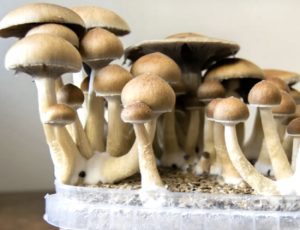
Research in 2016 suggests that shiitake mushrooms help fight cancer cells and the lentinan in shiitakes help heal chromosome damage caused by anticancer treatments.
Shiitake mushrooms are a great source of B vitamins, which help support adrenal function and turn nutrients from food into useable energy. They also help balance hormones naturally and even improve cognitive performance by breaking through brain fog to maintain focus all day long.
References:
https://pubmed.ncbi.nlm.nih.gov/25866155/
https://www.ncbi.nlm.nih.gov/pmc/articles/PMC3199106/
https://pubmed.ncbi.nlm.nih.gov/16566671/
Lions Mane
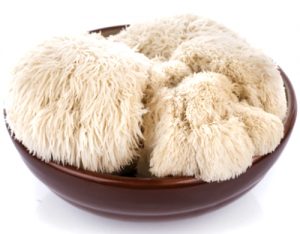
A large body of research has focused around this brain-boosting mushroom in the last few years and the results are astounding.
One method by which lion’s mane affects brain function is by enhancing “neurite outgrowth” in the brain and related organs, according to research published in the International Journal of Medicinal Mushrooms.
Neurite outgrowth refers to the growth of axons and dendrites from neurons. That’s a big deal in brain health research. By increasing this growth, it could potentially slow or reverse cell degeneration in the brain, the main characteristic of diseases like Alzheimer and Parkinson.
In varying degrees, compounds from or supplementation with lion’s mane mushroom, has been found to potentially slow the progression or reverse the spread of leukemia, gastric cancer, lung cancer, cervical cancer, liver cancer, colon cancer and breast cancer.
A study published in the Journal of Agricultural and Food Chemistry lists the benefits of lion’s mane mushroom as “antibiotic, anticarcinogenic, antidiabetic, anti-fatigue, antihypertensive, anti-hyperlipodemic, anti-senescence [anti-aging], cardioprotective, hepatoprotective, nephroprotective, and neuroprotective, and improves anxiety, cognitive function, and depression
A 2012 study conducted in Malaysia found that consuming lion’s mane mushroom could actually regenerate damaged cells from peripheral nerve injury, an injury affecting the delicate tissue between your brain and spinal cord.
UPDATE: 01/2021
A new report on the benefits of Lions Mane and Brain-derived neurotrophic factor (BDNF) has just arrived on my desk from Dr Rhonda Patrick, one of my favourite go to sources when researching functional nutrition. It makes compelling reading.
References:
https://pubmed.ncbi.nlm.nih.gov/26244378/
https://pubmed.ncbi.nlm.nih.gov/26853959/
https://pubmed.ncbi.nlm.nih.gov/24266378/
Turkey Tail Mushrooms
When it comes to functional foods, the turkey tail mushroom, may top the list. It’s the most researched functional mushroom of the bunch, proven to promote immune function.
Turkey Tail is prized for its beta glucan polysaccharides. Polysaccharides are “essential sugars” in the body that aid in activating immunity in the body. Clinical trials suggest that bacterial infections can be reduced using polysaccharides. The polysaccharides have strong communication with all T cells that are an essential part of white blood cells when fighting infection.
Known to stave off any infection, including those associated with the common cold or flu, it helps the immune system become more resilient against ill-causing germs. So when flu season approaches, you may want to include turkey tail in your dietary routine.
Studies are focussing on how turkey tail mushrooms may help cancer patients who are going through chemotherapy. As chemotherapy suppresses the immune system, the hope is that turkey tail mushroom builds the immune system up to better handle the weakness that chemo all too often causes.
Reishi
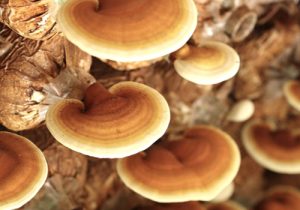
Used for its healing abilities for thousands of years, this edible fungus fits the definition of a true superfood.
Often referenced as the king of the mushrooms, research in Japan, China, the U.S. and the U.K. demonstrate that reishi mushrooms are capable of offering protection against numerous diseases or illnesses.
Working as an “immune modulator,” reishi mushrooms help restore hormonal balance, bringing the body back to homeostasis while regulating activity of the immune system. This helps in the good fight against tumours and cancerous cells.
Reishi mushrooms act as a normalizing substance, regulating various cellular functions and systems, including the endocrine (hormonal), immune, cardiovascular, central nervous and digestive system.
Maitake Mushrooms
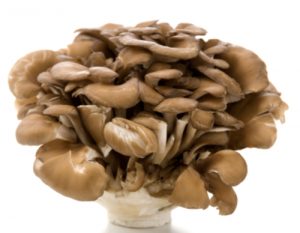
Often referred to as Hen of the Woods, Maitake Mushrooms are not only delicious, they also boast of some amazing health benefits.
From regulating blood sugar to dropping cholesterol levels, Maitake work as adaptogens. Their powerful properties naturally restore and balance the body to promote better health.
Animal studies show maitake mushrooms are thought to boost immune function, reduce cholesterol, fight viruses and cancer and modulate blood pressure and sugar levels.
Recently, several promising studies have researched the potential connection between the maitake mushroom and cancer. Although research is still limited to animal models and in vitro studies, maitake mushrooms may contain powerful cancer-fighting properties .
Other research suggests maitake mushrooms may be therapeutic against PCOS (Polycystic ovarian syndrome) and could help combat common issues like infertility.
And animal studies indicates ingesting maitake mushroom for eight weeks lowers blood pressure as well as levels of triglycerides and cholesterol.
References:
https://pubmed.ncbi.nlm.nih.gov/7820117/
https://pubmed.ncbi.nlm.nih.gov/2738717/
https://pubmed.ncbi.nlm.nih.gov/11349892/
https://pubmed.ncbi.nlm.nih.gov/21034160/
Cordyceps
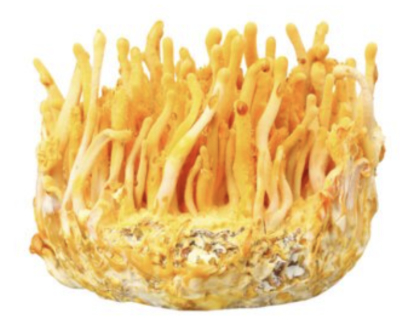
Cordyceps can help the body utilize oxygen more efficiently and enhance blood flow. This can be helpful for athletes or those who regularly work out. This mushroom has been shown to not only improve exercise and athletic performance, but also speed up post-workout muscle recovery. The mushroom is also known for stimulating both energy and the libido.
References:
https://www.ncbi.nlm.nih.gov/pmc/articles/PMC3909570/
https://www.ncbi.nlm.nih.gov/pmc/articles/PMC4174424/
https://www.liebertpub.com/doi/abs/10.1089/acm.2009.0226
Your Quick Guide to Functional Mushrooms



